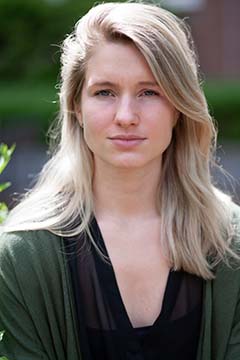What is true? Establishing the truth in international criminal law
Text: Annemieke van der Kolk, UG Communication Office. Photos: Daniël Houben
Dominic Ongwen was a child soldier in Uganda. He is currently standing trial as one of the leaders of the Ugandan Lord’s Resistance Army. But what is he claiming and more importantly, how much of it is true? Lawyer Suzanne Schot is sifting through the transcripts of court cases like the one against Ongwen. She has scrutinized thousands of pages of literal transcripts of cases that were heard in the International Criminal Court and the Yugoslavia Tribunal, searching for potential distortions of truth in the testimony given by witnesses and the accused. Where do these ‘deviations from the truth’ come from, and what are the implications in terms of establishing the truth?

Deviating from the truth
Schot speaks as one would expect a lawyer to speak: well-considered, choosing her words with great care. She sometimes refers to the notes she has prepared to make certain that she is using the correct phrasing. After all, she sees the importance of using the right words day in, day out, during her research into the testimony given by witnesses and the accused. Schot is studying testimony that, as she carefully explains, ‘appears to be different or deviate from the truth’; testimony that is inconsistent, incomplete or inaccurate. ‘Witnesses or the accused sometimes forget certain details or interpret them in their own way. Of course, they can also tell blatant lies or be manipulated into making a particular statement.’
Huge legal challenge
Schot operates within the field of international criminal law, researching crimes that involve large numbers of people: the genocide, war crimes and crimes against humanity that we read about in the media. ‘Prosecuting those responsible for these crimes is a huge legal challenge, which is what makes it so interesting.’ Her research focuses on the passage of time between the crime, the investigation and the actual trial. ‘In many cases, years have passed. International crimes are often perpetrated by groups of criminals, and usually involve a lot of people by definition. The situations can be extremely violent, stressful and traumatic. I am studying the consequences that this has on establishing the truth.’ Schot hopes that her research will contribute to international criminal law. ‘I want to ensure that justice is done to the testimony given by witnesses and the accused, who give their version of the truth during a trial.’
Getting under the skin of a trial
Schot is ploughing through thousands of pages of court transcripts. ‘And this is just a selection,’ she says. ‘I had to restrict myself to the Yugoslavia tribunal and the International Criminal Court, otherwise I would never have got through the sheer volume of cases.’ She takes note of how the questions were formulated, whether the judge interceded, and whether there were any inconsistencies. ‘I classify everything in a special database and encode anything that stands out. Ultimately, I look for themes and patterns that I can use. In addition, I study case law from international criminal courts and tribunals and the Dutch adjudication of international crimes, or in other words, the final rulings made the judges. I try to see how they assess the reliability of the testimonies and the credibility of the witnesses. I suppose you could call it getting under the skin of the trial.’
Unlike an exciting thriller
These court transcripts are anything but exciting thrillers. The things that Schot reads are raw and painfully real. ‘The documents are literal transcripts of what people said and in many cases, the things they have been through are extremely unpleasant. You have to learn to deal with this. I find it easier to read the documents from a scientific perspective, like data. But in some ways, this is also what motivates me: I know why I'm doing it.’
Beyond the bounds
Schot’s research goes beyond the bounds of international criminal law. She is a qualified lawyer and criminologist, and can fall back on a huge body of knowledge from the fields of psychology, sociology and psychiatry. ‘This makes my research very dynamic; I try to understand the best legal way to proceed from various different perspectives. I regularly attend conferences. Answering critical questions from my peers keeps me on my toes. I love the fact that you can have a dialogue with people in this way, and it serves to advance your research,’ she adds.
Man or monster
At present, Schot is analysing the last cases of the International Criminal Court. ‘I'm waiting for more transcripts from the case against the Ugandan Dominic Ongwen, who is currently on trial.’ As a child, Ongwen was kidnapped by the ‘Lord's Resistance Army’, the rebel group led by Joseph Kony. He became a child soldier and is now accused of rising to a position in which he committed war crimes and recruited child soldiers himself. Is someone like this a man or a monster? ‘You can't look at it in such a binary way. We tend to hold very black-and-white views about people who have committed crimes. The reality is often much more nuanced. Some perpetrators are themselves traumatized by the crimes that they have committed. And this can have implications for the testimonies they give during an investigation or prosecution, either in their own case or in that of someone else. I hope that my thesis will raise awareness of this.’
Unreliable memory
When asked about how her research into establishing the truth has impacted on her day-to-day life, she has to smile: ‘Luckily I don't encounter crime in my own environment, but my research has taught me how unreliable memory can be. That was quite an eye-opener, including in relation to my own memories.’
More news
-
26 February 2026
What can the law do for women? Join International Women’s Week!
-
08 December 2025
Colourful Characters: Bert Röling
